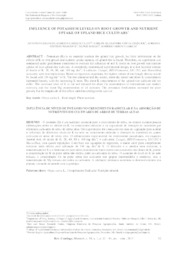Influence of potassium levels on root growth and nutrient uptake of upland rice cultivars.
Influence of potassium levels on root growth and nutrient uptake of upland rice cultivars.
Author(s): CARMEIS FILHO, A. C. de A.; CRUSCIOL, C. A. C.; NASCENTE, A. S.; MAUAD, M.; GARCIA, R. A.
Summary: Potassium (K) is an essential nutrient for upland rice growth, but little information on the effects of K on root growth and nutrient uptake capacity of upland rice is found. Therefore, an experiment was conducted under greenhouse conditions to evaluate the influence of soil K levels on root growth and nutrient uptake of four upland rice cultivars. A completely randomized experimental design, in a 4x4 factorial scheme (4 levels of K: 20, 40, 80, and 160 mg dm-3; 4 cultivars: Caiapó, BRS-Primavera, IAC-202, and Maravilha) was used, with four replications. Based on regression equations, the highest values of root length density would be found with 136 mg dm-3 of K. The root diameter and dry matter, shoot dry matter and shoot K concentration increased linearly with the increasing K rates. The shoot K concentration of the upland rice cultivars did not differ. The increased level of K in the soil reduced the shoot Ca concentration of intermediate and modern cultivars, and the shoot Mg concentration of all cultivars. The potassium fertilization increased the plant growth, but the magnitude of this effect varied according to the cultivar.
Publication year: 2017
Types of publication: Journal article
Unit: Embrapa Rice & Beans
Keywords: Arroz, Comprimento radicular, Nutrição mineral, Oryza sativa, Potássio
Observation
Some of Embrapa's publications are published as ePub files. To read them, use or download one of the following free software options to your computer or mobile device. Android: Google Play Books; IOS: iBooks; Windows and Linux: Calibre.
Access other publications
Access the Agricultural Research Database (BDPA) to consult Embrapa's full library collection and records.
Visit Embrapa Bookstore to purchase books and other publications sold by Embrapa.

